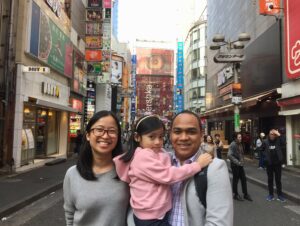Here are some things to think about and some questions to discuss as you reach out to your church neighborhood and/or church community.
 By Aron and Joyce Tolentino, Pastors in Metro Manila
By Aron and Joyce Tolentino, Pastors in Metro Manila
The call to participate
The ministry of Jesus Christ is to draw people back to himself. We trust that through the Spirit, he continues to move to open the minds and hearts of people to the gospel. As the church, we are called to join in the ministry of Jesus. This is an invitation to joyfully participate in his redemptive work in our churches, neighborhoods, and communities.
Editor’s note: The terms neighborhood and community are dependent on your church location. A local congregation in a neighborhood would focus on the one square mile around your church location. A congregation in a rural setting (community) might focus on the 5-10 square miles around your church location. Both terms are used throughout this article.

Many of us participate in small churches, and community engagement can seem quite daunting as we figure out where to start, which programs might help us, where to find manpower and resources, and what the end result might look like. A crucial component of community engagement is discernment. How is Jesus moving?
This question is a fundamental one for our local church as well as our community. Taking time to assess our congregation and the neighborhood we are in is important to help ensure that our efforts at relationship building are authentic, relevant, and sustainable. As a team, it would be good to collectively think about where our neighborhood is and what they need, and then ask what we have that could help us respond. Who are the people in our neighborhood, and what can we offer them as a profound expression of love?
Embrace your uniqueness
Across the world and even within our respective countries, our congregations may look quite different from each other. But we can identify and utilize our unique characteristics and strengths to connect with the people around us. Our own local church, for instance, is multigenerational – with experienced members, seniors, and parents, as well as several young people who have been with us since their early teens and who have now grown into older students and young professionals. We are based in a metropolitan area with many mega churches, but while we are much smaller in comparison, there is a strong sense of family and intimate fellowship which has been appreciated by new people who have joined over the years. What does the unique composition of your local church look like? What attributes have helped facilitate growth or acted as enablers for ministry?
Build on relationships
Part of our internal assessment is looking at our existing connections. What relationships do we have that we could intentionally deepen? In our congregation, there are several teachers and educators, and one of our pastoral team members was the principal of a large public high school in the area covered by our church. In the past, GCI Philippines had conducted spiritual formation events for teachers, and our local church had supported members of the student council to attend our GCI summer camps. The familiarity from our previous engagements, and the goodwill and support of the principal who was also a church member, were factors that led our local church to choose this neighborhood to focus on. This led to opportunities for us to engage with the high school’s faculty and students more often, get to know them, and build trust through consistent presence as co-organizers of activities like teachers’ Bible study sessions and trainings of student leaders.
What relationships, networks, or connections does your local church have which you can build on? Do you have a “person of peace” who could open doors for you to engage in the community? Do you have members who naturally have a heart for others, who are courageous in approaching strangers and making new friends? These people see their relationships in light of the gospel and can rally the congregation by being on the front lines as potential Love Avenue members.
Missional mindset
Not everyone has the make-up or inclination to be frontliners in the community, but we can help the church as a whole develop a missional mindset. This means always keeping the community in mind with whatever we do in church – including our liturgy, our facilities, our giving, our special celebrations, the way we welcome guests and fellowship with each other. In all we do, we consider the people beyond our four walls. Developing a missional mindset cuts across Faith, Hope and Love Avenues. How do we help our members understand our beliefs in a way that guides and motivates their missional mindset towards our community? As we reach out, how do we also usher people to and make them feel included in the life of the local church?
Meet people where they are
If you are just beginning to engage with your community, an initial challenge would be thinking up creative and memorable ways to draw in people and introduce the church to them. An alternative approach is to observe what people in the community are doing and assess where we can offer support. Jesus drew near to us through the incarnation; we too can draw near to the people in our community and demonstrate genuine interest in and care for them.
It is in spending time with our community that we better understand what the needs are, how we can help champion shared causes, and how to respond to real needs – whether these are for funds, people, expertise, or support in whatever form we have the capacity to provide. One of the things our local church has done is to take part in the high school’s annual fundraising drive to improve their facilities. Another is co-hosting monthly meetups of student leaders, which are drop-in meetings where our church members serve as resource speakers on leadership and values. These meetings were initially meant for members of the student council but because the teachers saw the value we added, the school later expanded these meetings to include heads and members of various student clubs.
As we reflect on how God has formed our local church and what characteristics and relationships he has given us, we should also discern what he is doing in the communities where we belong. Do we know the people surrounding us? What are their mission and values? Are there pressing needs we can respond to, gaps we can help fill, or ongoing initiatives with community ownership that we can help promote?
Courage to try
There are many considerations as we prepare to engage with our community in meaningful and intentional ways, but don’t let this hinder you from actually making a start. Following initial reflection, don’t be afraid to get out there and try. Begin in small ways – show up at a community event, introduce yourself, strike up a conversation. Encourage church members to get their feet wet. Leave room for mistakes and learn from them. Part of the discernment process is considering which approaches are working and what doors are opening, and prayerfully seeking the Spirit’s leading in what paths to take. It is still better to try, fail, and learn from it than to not try at all. All relationships, including the ones we are cultivating with our communities, take patience, consistency, and time. At the end of the day, the goal is to love our neighbors with the love we have received from God.



Thank for the excellent, concise help and the sharing of your invaluable experience to us.God continue to bless you!